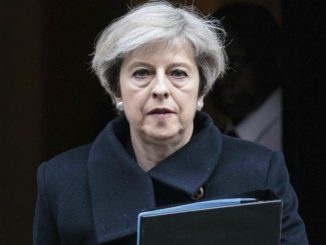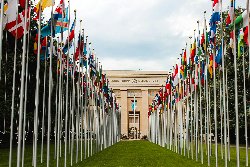Gordon Campbell on the latest roll of the Brexit dice
Gordon Campbell on the latest roll of the Brexit dice, and prisoner voting
First published on Werewolf Brexit has left the British public
looking like a nation of Wellington bus commuters. In both
cases, the unholy mess bears no resemblance to what people
were promised or the spin being used to justify it. In both
cases, the only sane response – to go back to the way
things were and write the whole thing off as a ghastly
mistake – is deemed to be utterly out of the question.
Brexit has left the British public
looking like a nation of Wellington bus commuters. In both
cases, the unholy mess bears no resemblance to what people
were promised or the spin being used to justify it. In both
cases, the only sane response – to go back to the way
things were and write the whole thing off as a ghastly
mistake – is deemed to be utterly out of the question.
Hard to feel much sympathy for British PM Theresa May. Two and a half years down the track from the referendum, she has come up with a final Brexit plan this week that no-one at all – Leave, Remain, hard Brexit, soft Brexit, pro-European, anti-European, Conservative, Labour, Lib Dem, Scottish Nationalist, DUP etc etc can only grudgingly accept, and then solely because having no deal at all might be even worse. When this column was written, the full text of the deal had not been released. Yet this morning, the British Cabinet has reportedly accepted a deal that yokes Britain to some of the EU’s most thoroughly demonized rules and regulations for an unlimited period, and without Britain having any say for the foreseeable future in how those trade rules get written. And that is merely the start of the bad news.
For most of 2018, the British negotiators have struggled to avoid creating a hard border between Ireland (which remains in the EU) and Northland Ireland (which doesn’t) without embracing a set of different rules and conditions for different parts of Britain. The easy solution – let EU-like customs rules apply to Northern Ireland but not to the rest of Britain – is politically out of the question, since this result would, in effect, undermine the unity of Britain.
Several unrealistic ‘backstop’ measures have been floated to avoid creating a hard border on land or a borderline drawn on the Irish Sea. Most of the variations put on the table have envisaged a sunset clause sufficient to preserve the unity of Great Britain while buying enough time until Britain can (hopefully) do a new free trade deal with Europe. In reality though, a backstop short enough to be politically sellable to the British public was always going to be not long enough to provide a viable basis for investment decisions.
How has May tried to square these circles? The initial reports this morning indicate that her plan envisages (a) Britain staying in the EU customs union for goods for a “limited period” (undefined) while (b) allowing EU fishers an unimpeded ability to fish in British waters plus (c) allowing Northern Ireland to eventually enter into a “deeper” relationship (when and how also undefined) with the EU than the rest of Britain. If those reports turn out to be true, May will have achieved the difficult feat of scoring two own-goals at once: a Brexit that doesn’t seem to involve leaving the EU, and a plan for safeguarding British interests that will ultimately involve destroying the unity of Britain.
En route to this destination, there has been excited talk of the need to devise backstops for the Northern Ireland backstop. Only yesterday in fact, Conservative hardliner Jacob Rees-Mogg tweeted his extreme displeasure that: “The separate rules for Northern Ireland have been put in one backstop, rather than being in a separate backstop, which if anything is worse than a backstop to the backstop.” If you say so… Never exactly a man of the people, Rees-Mogg went on to gloomily liken the situation to 1846. Decoded, this analogy means that the insufferable Rees-Mogg feels that the current divisions in Theresa May’s Conservative Party are comparable to the ancient splits that existed among Conservatives in 1846 over the best policy towards the Corn Laws – which ended up with Sir Robert Peel getting the votes he needed for repeal by reaching across the aisle to the opposition Whigs.
In similar vein Theresa May will be banking on a sizeable bloc of Labour defectors being willing to break ranks, and vote for deal. She will need that help to get the deal through Parliament if the Democratic Union Party (DUP) of Northern Ireland baulks at the final text. All along, the grim sales pitch that May has been pushing is: you may not like my deal, but it is the only option to avoid Britain exiting the EU on March 29 next year without any deal at all. Earlier this week Scotland’s First Minister Nicola Sturgeon tried to counter this narrow choice between two dire options.
If the PM’s ‘deal’ satisfies no-one and can’t command a majority, we mustn’t fall for her spin that the UK crashing out of EU without a deal is then inevitable - instead we should take the opportunity to get better options back on the table.
Now that May has apparently got her Cabinet to endorse the deal, this is what will happen next:
Even if the Cabinet hurdle is surmounted without a hitch, though, May’s toughest challenges may still lie ahead. She expects the EU to convene a summit in late November to sign off on the deal and then, most likely in early December, the drama moves back to Westminster, where every MP must decide whether they can support the deal.
Come December though, the British Parliament is likely to be permitted only a limited form of scrutiny. Reportedly, the debate on the deal will be only 90 minutes long, and (as things currently stand) the process will not allow any amendments to the Brexit deal to be tabled. Come December – if the deal gets that far - it looks like being a ‘yes/no, take it or leave it’ vote taken amid dire warnings that Britain faces catastrophe if Parliament doesn’t fall into line. It all sounds very much like the old Hilaire Belloc satirical poem about Jim, the little British gentleman who ran away and got eaten by a lion, which ends:
“And always keep ahold of Nurse/for fear of meeting something worse.”
Prisoners Voting ? No Rush
While Justice Minister Andrew Little has been lavishly praised for announcing that the Pike River mine will begin to be re-entered in February, it has been disappointing to see Little’s simultaneous disinterest in restoring the right to vote to people imprisoned for minor offences. In both cases, New Zealand First appear to have been driving both the mine re-entry, and the backdown on prisoner voting. On Pike River, remember how NZF leader Winston Peters once vowed to be the very first person down the drift? NZF are not keen on extending human rights to prisoners, either.
Back in 2010 though… Labour had loudly condemned the Key government for playing to the redneck vote by removing the right to vote from every adult who happened to be in jail at election time. Prior to 2010, the New Zealand policy had been identical to that of Australia, which denies the right to vote only to those prisoners in jail for sentences of three years or more (ie the serious offenders). In 2010, even Attorney-General Chris Finlayson had slammed the Key government’s blanket ban on prisoner voting as a contravention of our Bill of Rights, among other deficiencies.
Yet this week, Little quietly washed his hands of the issue for the time being:
Justice Minister Andrew Little told reporters he personally disagreed with the ban, but the government as a whole had yet to take a position. "It's not that much of a priority," he said. "We haven't even had a discussion about that and it would be wrong for me to express any view on behalf of the government about it." Ministers were unlikely to consider the issue for at least a year, he said.
Why this sudden outbreak of disinterest? Not for the first time, prisoners are being treated as political footballs. Just as the Key government played to the redneck vote back in 2010, Little seems OK about Labour becoming captive to the hardline ‘lock ‘em up’ faction that exists within New Zealand First.
Earlier this year, Little had been blindsided by NZF leader Winston Peters when Labour tried to scrap the “Three Strikes” legislation. Rather than risk losing a similar fight, Little now seems gunshy about fighting at all on this issue. NZF is probably not his only concern. The politics of delaying any action would also deny National the opportunity to paint prisoners winning back the right to vote as an example of a centre-left government going soft on criminals. Labour is already facing that charge over its handling of the Karel Sroubek immigration case.
So… postponing any action on this issue might be seen as politically astute by Labour tacticians , but it is deeply disappointing. Especially given that the Supreme Court has just found New Zealand’s blanket ban on prisoner voting to be ‘inconsistent’ with our Bill of Rights.
It is also incompatible with the rest of Labour’s initiatives on programme on prison reform and rehabilitation. After all, prisoners are automatically taken off the electoral rolls, which means that once they’re released from prison they have to re-register to win back their ability to vote. It can be a lasting disenfranchisement.
“It’s not that much of a priority,” says Little. Hmmm. Centre-left governments used to think that the rights of prisoners shouldn’t be sacrificed to indulge the desire for societal revenge. I’d also have thought that – when you’re the Justice Minister – defending section 12 of our Bill of Rights should be a priority.
Footnote : Back in 2010, Werewolf interviewed Rick Sauve, the former convicted murderer and prisoner advocate who took the legal case that ultimately convinced the Canadian Supreme Court to scrap the ban on prisoner voting. Here’s the essence of that story and the Sauve interview:
Getting sent to prison means that people lose their right to a whole range of rights and freedoms. Why should the right to vote be held up as being something sacrosanct? “You go to prison for a punishment,” Sauve replies. “That is your punishment: the loss of freedom of movement. It really is severe. When you’re locked in your cell at night and you are all alone, that’s when you realize you’re really doing time. That’s also when you think about how you want to fit back into the community. I wanted to be able to fit back in. I wanted to show that I could make it, that I could be something other than my crime…”
In essence, removing the right to vote from prisoners means that he or she literally becomes a non-person. Given that most prisoners will one day be returning to society, how could it be in society’s self-interest to promote such an attitude? “I don’t think it is,” Sauve replied. “I know that a lot of people want revenge. They don’t necessarily want justice.”
Sauve continued: ‘I think that many people don’t seem to realize though, that prisons are a community. It is a small community but it is one, all the same. A lot of people do charity work while they are in prison. Does it mean that people in prison shouldn’t be allowed to help other people? That they shouldn’t be entitled to healthcare? Or that someone in prison shouldn’t be allowed to have contact with their family, who are out in the community? No, we don’t isolate people like that. Not any more. What we hope for as a society is that people – when they are inside prison – are going to start to embrace the norms of the free world. But if instead, you continuously tell people: we don’t want you; you’re not one of us; you shouldn’t have this, you shouldn’t have that… Well, people constantly hearing that message are likely to act out. They really are.”
William Tyler
Over the course of three extraordinary albums, the former Lambchop lead guitarist William Tyler has demonstrated that lyrics are not essential for communicating a sense of romance, geography and uneasy regret. On this first track from his new album Goes West though, Tyler has managed the difficult feat of conveying a sense of joy. Someone has said this track “Fail Safe” feels like sunshine breaking through clouds, and that’s an apt description:
And from his last album, here’s “Highway Anxiety” which brilliantly conveys the restlessness and sense of dislocation now pervasive in the American heartland:


 Gordon Campbell: On When Racism Comes Disguised As Anti-racism
Gordon Campbell: On When Racism Comes Disguised As Anti-racism Peter Dunne: Newshub And TVNZ Tip Of Media Iceberg
Peter Dunne: Newshub And TVNZ Tip Of Media Iceberg Harry Finch: Austerity – For And Against
Harry Finch: Austerity – For And Against Gordon Campbell: On Winston Peters’ Pathetic Speech At The UN
Gordon Campbell: On Winston Peters’ Pathetic Speech At The UN Binoy Kampmark: Flicker Of Hope, Biden’s Throwaway Lines On Assange
Binoy Kampmark: Flicker Of Hope, Biden’s Throwaway Lines On Assange Media Matters NZ: Here We Go Again
Media Matters NZ: Here We Go Again